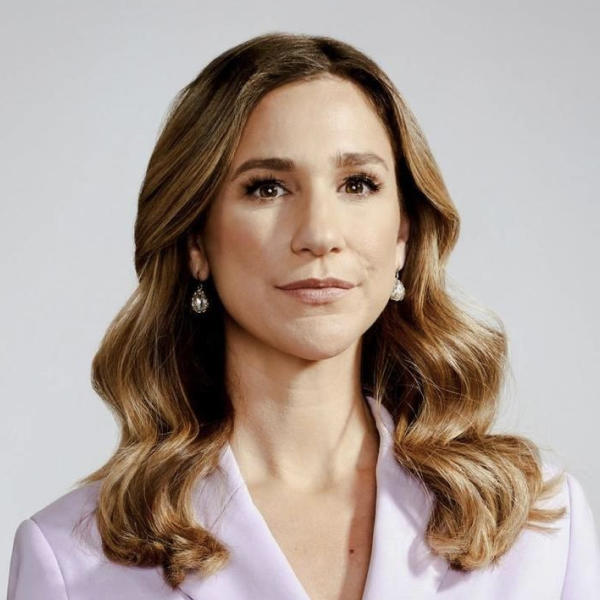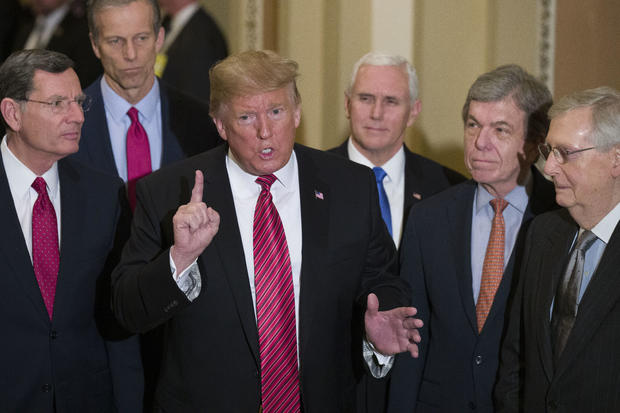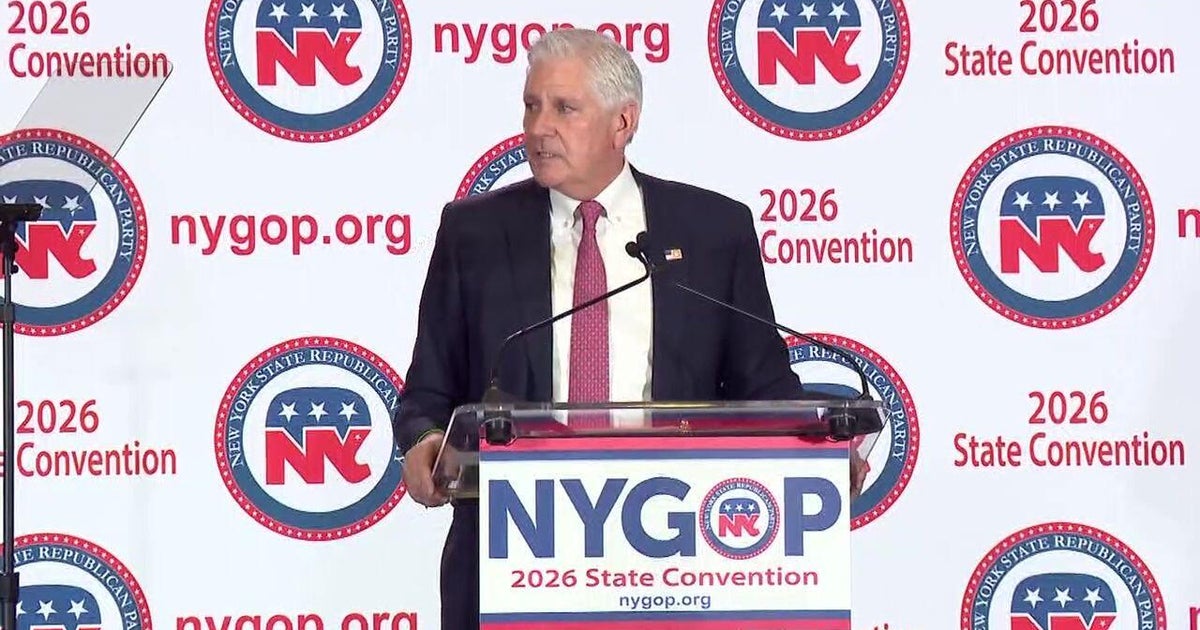Republicans are backing an aggressive policy toward Ukraine, breaking with Trump
Republican lawmakers have spent the last half decade following Donald Trump's lead, even as he moved the party away from long-held party philosophy. But when it comes to Russia's invasion of Ukraine, GOP officials are no longer taking their cues from the former president.
Condemnation of Vladimir Putin is a rare unifying force on Capitol Hill. Few Republicans are echoing Trump's description of the Russian president as savvy or smart. Former Vice President Mike Pence said there was no room in the party for "apologists for Putin." Sen. Lindsey Graham of South Carolina even went as far to say that Putin should be assassinated.
And after the years standing by as their party leader questioned the value of NATO and traditional global security alliances, threatened to withhold aid to Ukraine in exchange for a political favor, and publicly took Putin's word over that of his intelligence agencies, Republicans are now arguing for every possible resource short of U.S. ground troops to help stop the war in Europe.
The "vast majority of the Republican Party writ large, both in Congress and across the country, are totally behind the Ukrainians and urging the president to take these steps quicker, to be bolder," Senate Minority Leader Mitch McConnell said Sunday on "Face the Nation."
"There's been a pretty dramatic division between the traditional post-WWII Republican view of our leadership in the world, which is the one I hold, and those who wanted to follow a policy that was more focused on retreating to thinking that somebody else would fill our role in the world if we didn't," Sen. Roy Blunt of Missouri told CBS News. "And I think what's happening at the current moment, most Republicans--and, frankly, most members of the Senate--have shifted to what I would see as a more internationalist view of our responsibilities. And I'm glad to see it."
There can often be a disconnect between party leaders and party voters. But in this case, polling shows support for taking a tougher stance on Russia among the party's rank and file.
CBS News polling finds 76% of Republicans approve of sanctioning Russia's oil and gas (and 62% say so even if it means higher gas prices), 75% say the U.S. should send weapons and supplies to Ukraine, and 61% say the U.S. should send troops to protect NATO allies near Ukraine.
Sen. Josh Hawley of Missouri, a Trump ally in the Senate, said his constituents are appalled at the Russian invasion and are telling him "we need to do everything we can" to help the Ukrainians.
"They are fighting for their existence. And Russia has aided every enemy of ours for the last 60 years. So I don't feel too bad — I know Putin wines that this is escalatory. He's invaded a sovereign nation. So we should arm the Ukrainians and give them every defensive weapon that they want," Hawley told CBS News. "We need to do everything we can do asymmetrically there in Ukraine to help the Ukrainians. And we should do that for the long haul, as long as it takes."
Hawley joined all Senate Republicans, with the exception of Mitt Romney, in exonerating Trump at his impeachment trial in 2019 that centered on his asking Ukrainian president Volodymyr Zelenskyy to investigate Joe Biden in exchange for military aid. In an interview with 60 Minutes at the time, House Minority Leader Kevin McCarthy said that Trump did nothing in that conversation with Zelenskyy that was impeachable.
Now, McCarthy is trying to keep some members of his conference who are speaking ill of Zelenskyy or echoing Trump's praise of Putin at bay. Republican Rep. Madison Cawthorn of North Carolina has come under fire for calling Zelenskyy a "thug" at a town hall.
When asked about the comments last week, McCarthy told reporters that "Madison is wrong. If there's any thug in this world it's Putin." McCarthy then referenced the Russian bombing of a maternity ward and a theater housing children. "This is atrocious, this is wrong, this is the aggressor, this is the one that needs to end this war," he said of Putin. "This is the one that everybody should unite against." (When asked whether he would support Cawthorn's re-election, McCarthy said "yes.")
Republicans are still largely opposed to direct U.S. military involvement in Ukraine, and there is very little appetite on Capitol Hill for the establishment of a no-fly zone, a reflection of the party's shift in the Trump era away from engaging in military conflict overseas. Colin Dueck, a senior fellow at the American Enterprise Institute who wrote a book on post-WWII Republican foreign policy, told CBS News that even though Trump tapped into voters' frustrations with traditionally hawkish GOP views, party voters still maintained their support of NATO and opposition to Putin. The invasion reminded them of those views, he says, and there has been a rallying around a hardline against Russia.
"It has often been the case that Trump acts and others react....what's interesting right now is that nobody seems to be deferring to him on this issue," said Dueck. "There is a momentum that is independent of him. And he has had to catch up with it."
In some cases, appearing to share Trump's rhetoric on Putin is becoming a liability for Republican candidates on the campaign trail.
In the North Carolina GOP primary for an open U.S. Senate seat, former Gov. Pat McCrory released an ad accusing his Trump-backed rival Rep. Ted Budd of taking Russia-friendly votes and praising Putin. The ad uses an interview clip in which Budd calls Putin a "very intelligent actor." Club for Growth then released an ad supporting Budd and arguing McCrory took the congressman's words out of context, and played clips of the full quote in which he called Putin "evil" and an "international thug."
According to Politifact, McCrory's ad cut out Budd's full quote: "I would say Putin is evil. But that doesn't mean he's not smart. He's a very intelligent actor, although I'd say he's been quite erratic in his approach to the Ukraine."
While Republicans are rallying around a hard line against Russia, they aren't eager to criticize Trump for his past behavior towards Putin. Instead, when asked about Trump's approach to Putin, they insist the policies outweigh the rhetoric.
"I have disagreed with President Trump's rhetoric on Putin, previously. I don't think it was helpful. But on substance, on the actual policies implemented, the Trump administration's policies on Russia were much, much tougher than the Biden administration's policies," Sen. Ted Cruz of Texas told CBS News, pointing to the sanctions he authored against Russia's Nord Stream 2 gas pipeline that Trump signed into law.
"There's probably a lot of mistakes that we could look at…I know Trump is criticized for his rhetoric. But I will say, in my view, when the time came to really get tough, to sanction Nord Stream 2 for instance, he was there at the end to do the right thing to be tough on them," Hawley told CBS News when asked if he thought the previous president miscalculated Putin. "But listen, that's in the rear view mirror. Now we have to think about, what are we going to do moving forward?"





